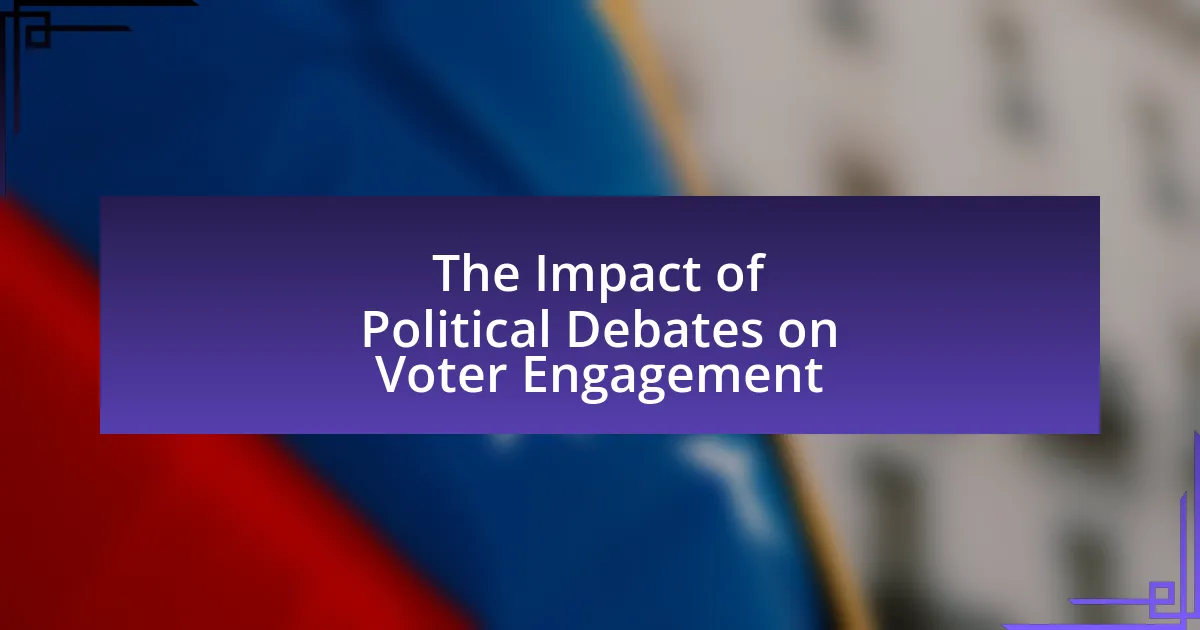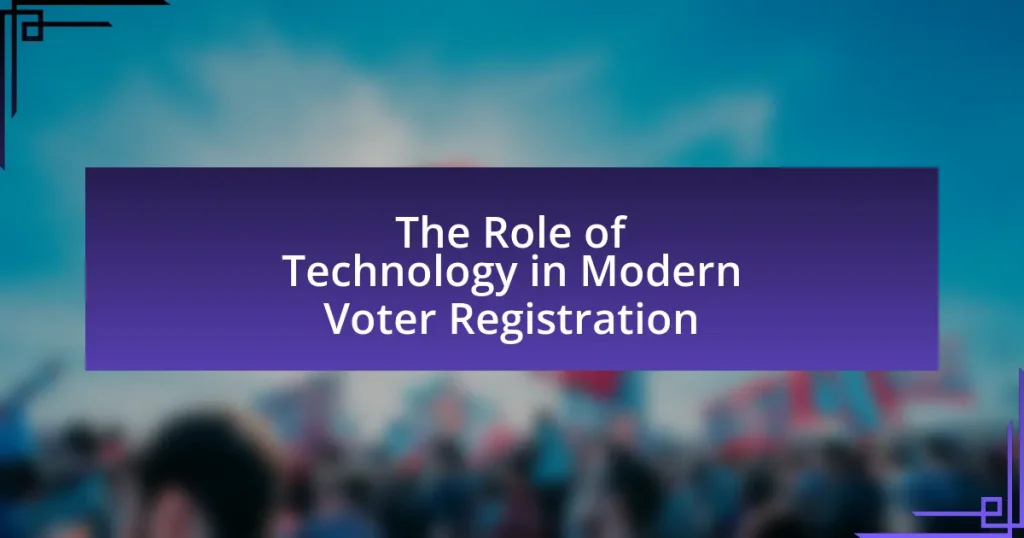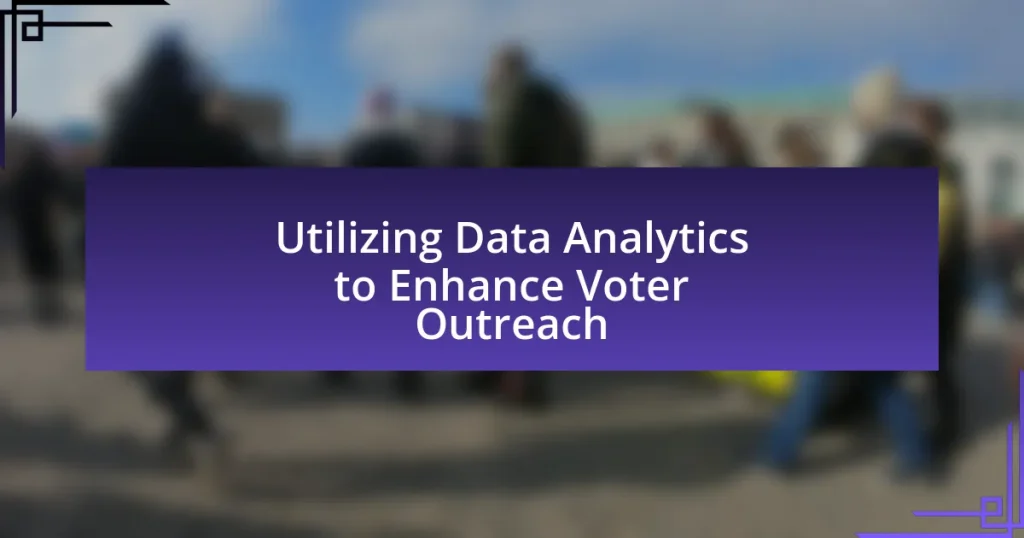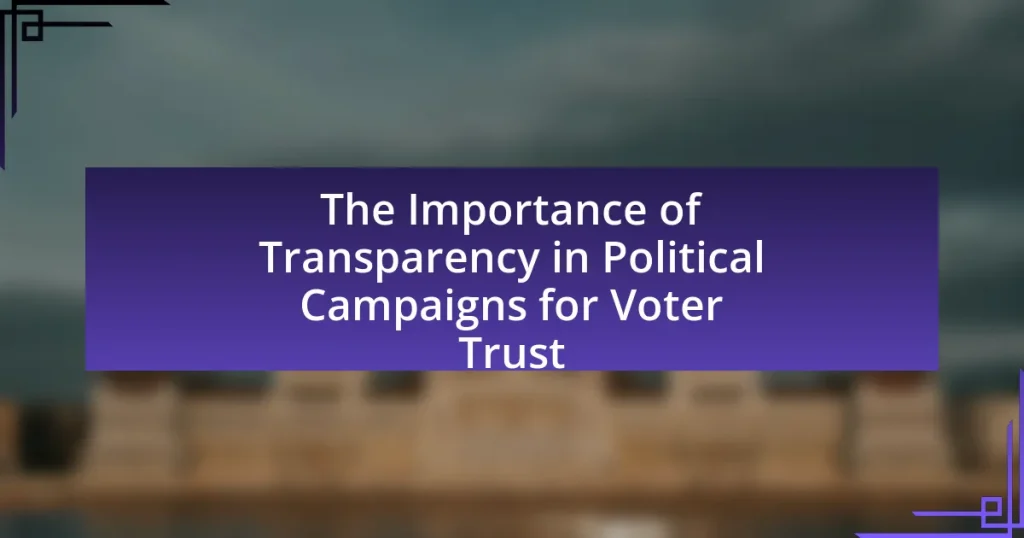The article examines the impact of political debates on voter engagement, highlighting how these events enhance voter turnout and influence public opinion. It discusses the role of debates in shaping voter perceptions, the significance of candidates’ performances, and the effects of debate formats on audience engagement. Additionally, the article explores historical contexts, psychological factors, and strategies for candidates to effectively communicate their messages, ultimately demonstrating how debates mobilize specific demographics and contribute to informed decision-making among voters.
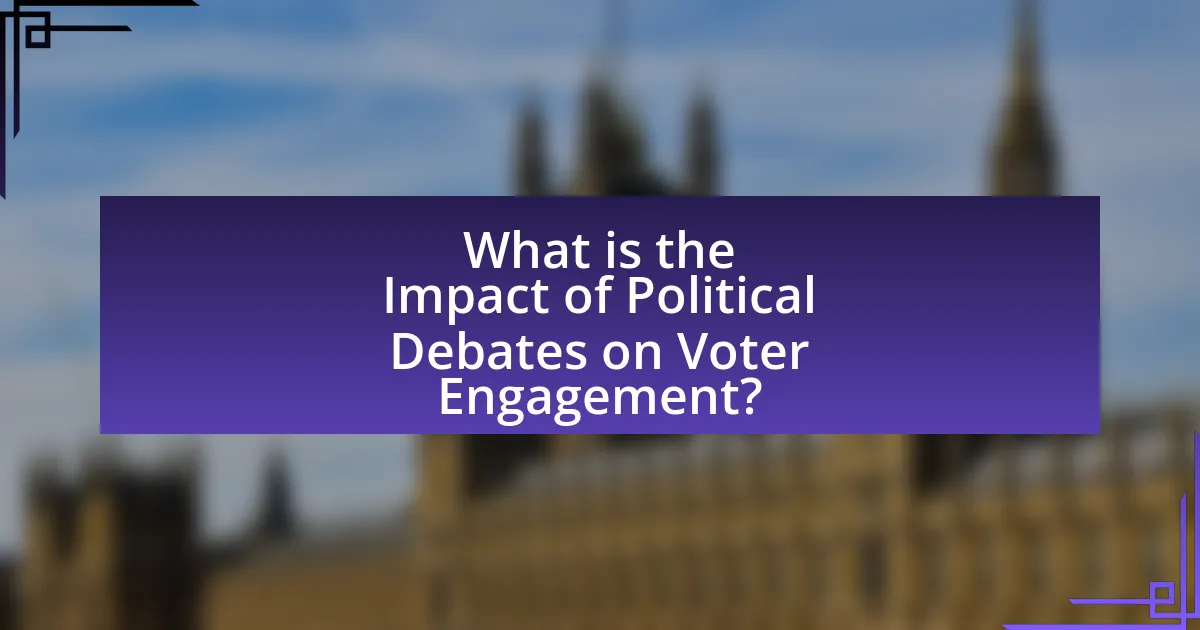
What is the Impact of Political Debates on Voter Engagement?
Political debates significantly enhance voter engagement by providing a platform for candidates to present their policies and interact with each other, which informs and influences public opinion. Research indicates that debates can increase voter turnout; for instance, a study by the Pew Research Center found that 63% of debate watchers reported being more motivated to vote. Additionally, debates often highlight key issues, allowing voters to make more informed decisions, as evidenced by a 2016 study published in the Journal of Politics, which showed that exposure to debates increased knowledge about candidates and their positions.
How do political debates influence voter perceptions?
Political debates significantly influence voter perceptions by shaping opinions, highlighting candidate differences, and providing a platform for direct comparison. During debates, candidates articulate their policies and respond to opponents, which can sway undecided voters. Research indicates that 67% of viewers report changing their opinions about candidates after watching a debate, as noted in a study by the Pew Research Center. This shift occurs because debates often clarify candidates’ positions on key issues, allowing voters to align their preferences with those who best represent their views. Additionally, the emotional tone and body language displayed during debates can impact voter trust and likability, further influencing perceptions.
What role do candidates’ performances play in shaping voter opinions?
Candidates’ performances significantly influence voter opinions by directly affecting perceptions of their competence, credibility, and relatability. Research indicates that strong debate performances can lead to increased voter support, as evidenced by a study from the University of California, which found that candidates who performed well in debates saw an average increase of 3-5% in polling numbers immediately following the event. This correlation highlights how effective communication and presentation skills during debates can sway undecided voters and reinforce the preferences of supporters.
How does the format of debates affect audience engagement?
The format of debates significantly influences audience engagement by determining how information is presented and perceived. Structured formats, such as timed responses and direct questioning, can enhance clarity and maintain viewer interest, as evidenced by studies showing that audiences are more likely to remain engaged when debates follow a clear, organized structure. For instance, a study by the Pew Research Center found that debates with a clear format led to higher viewer retention rates, as participants could easily follow the discussion and understand the candidates’ positions. In contrast, unstructured debates often result in confusion and disengagement, as audiences struggle to track the conversation and may lose interest.
Why are political debates significant in the electoral process?
Political debates are significant in the electoral process because they provide a platform for candidates to present their policies, engage with opponents, and connect with voters. This interaction allows voters to assess candidates’ positions on key issues, which influences their decision-making. Research indicates that debates can increase voter engagement; for instance, a study by the Pew Research Center found that 67% of voters reported that debates helped them make informed choices during elections. Additionally, debates often highlight differences between candidates, clarifying their stances and enhancing voter understanding of the electoral landscape.
What historical context supports the importance of debates?
Debates have historically played a crucial role in shaping public opinion and political discourse, particularly evident during the Lincoln-Douglas debates of 1858, which highlighted the significance of public argumentation in democratic societies. These debates not only addressed critical issues such as slavery and state rights but also engaged voters directly, influencing their perspectives and decisions. The televised debates of the 1960 Kennedy-Nixon election further underscored the importance of visual rhetoric and public perception, demonstrating how debates can sway voter engagement and electoral outcomes. Such historical instances illustrate that debates serve as platforms for candidates to articulate their policies, challenge opponents, and connect with the electorate, thereby reinforcing their importance in the political landscape.
How do debates compare to other forms of political communication?
Debates are a distinct form of political communication that emphasize direct confrontation of ideas, allowing candidates to articulate their positions in real-time, which contrasts with other forms such as speeches, advertisements, or social media posts that often lack immediate interaction. In debates, candidates respond to each other and to questions from moderators or the audience, fostering a dynamic exchange that can reveal their critical thinking and adaptability under pressure. Research indicates that debates significantly influence voter engagement; for instance, a study by the Pew Research Center found that 66% of viewers reported being more informed about the candidates’ positions after watching a debate, compared to only 45% who felt similarly after viewing campaign ads. This interactive nature of debates enhances their effectiveness in shaping public opinion and voter turnout compared to more passive forms of political communication.
What factors contribute to the effectiveness of political debates?
The effectiveness of political debates is primarily influenced by the clarity of candidates’ messages, the format of the debate, and the engagement of the audience. Clear messaging allows voters to understand candidates’ positions and policies, which is crucial for informed decision-making. Research indicates that debates with structured formats, such as time limits and specific question rounds, enhance the clarity and focus of discussions, making it easier for viewers to follow and compare candidates. Additionally, audience engagement, including live polling and social media interaction, can amplify the impact of debates by fostering a sense of participation and urgency among voters. Studies show that debates that actively involve the audience can lead to increased voter interest and turnout, demonstrating the importance of these factors in shaping the overall effectiveness of political debates.
How does media coverage impact voter engagement during debates?
Media coverage significantly enhances voter engagement during debates by increasing visibility and accessibility of the candidates’ positions. When debates are extensively covered by various media outlets, they reach a broader audience, allowing more voters to form opinions based on the candidates’ performances. Research indicates that televised debates can lead to a 10-20% increase in voter turnout, as seen in the 2008 U.S. presidential election, where media coverage played a crucial role in mobilizing younger voters. Furthermore, real-time analysis and commentary during debates help contextualize candidates’ statements, fostering informed discussions among the electorate.
What psychological factors influence voter reactions to debates?
Psychological factors that influence voter reactions to debates include cognitive biases, emotional responses, and social identity. Cognitive biases, such as confirmation bias, lead voters to favor information that aligns with their pre-existing beliefs, affecting how they interpret candidates’ performances. Emotional responses, including feelings of trust or anger, can significantly sway voter opinions based on candidates’ demeanor and rhetoric during debates. Additionally, social identity influences voter reactions, as individuals often align their perceptions with the group they identify with, impacting their evaluation of candidates. Research indicates that these psychological factors play a crucial role in shaping voter engagement and decision-making processes during political debates.
How do political debates affect voter turnout?
Political debates significantly influence voter turnout by increasing public interest and engagement in the electoral process. Research indicates that debates serve as a platform for candidates to present their policies and for voters to evaluate their options, leading to heightened awareness and motivation to participate in elections. For instance, a study by the Pew Research Center found that 66% of debate viewers reported being more likely to vote as a result of watching the debates. This correlation suggests that debates not only inform voters but also energize them, ultimately contributing to higher turnout rates during elections.
What evidence exists linking debate viewership to increased voter participation?
Research indicates that debate viewership is positively correlated with increased voter participation. A study conducted by the Pew Research Center found that individuals who watched presidential debates were more likely to report being motivated to vote, with 63% of debate viewers stating they were very likely to participate in the upcoming election compared to 43% of non-viewers. Additionally, a report from the American Political Science Review highlighted that debates serve as a critical source of information, particularly for undecided voters, leading to higher engagement levels. These findings demonstrate a clear link between watching political debates and enhanced voter turnout.
How do debates mobilize specific demographics of voters?
Debates mobilize specific demographics of voters by addressing issues that resonate with their unique concerns and values. For instance, when candidates discuss topics such as healthcare, education, or climate change, they can engage younger voters who prioritize these issues. Research indicates that 60% of young voters reported being more likely to vote when they felt their issues were represented in debates (Pew Research Center, 2020). Additionally, debates often highlight contrasting viewpoints, which can energize partisan voters and increase turnout among those who feel strongly aligned with a candidate’s stance. This targeted engagement is crucial, as studies show that debates can significantly influence voter motivation and decision-making, particularly among demographics that feel marginalized or underrepresented in the political discourse.
What strategies can candidates use to enhance voter engagement through debates?
Candidates can enhance voter engagement through debates by employing strategies such as addressing key voter concerns, utilizing clear and relatable language, and actively encouraging audience participation. By focusing on issues that resonate with the electorate, candidates can create a connection that motivates viewers to engage with their platforms. For instance, studies show that candidates who articulate policies in simple terms are more likely to be understood and remembered by voters, leading to increased engagement. Additionally, incorporating interactive elements, such as live polls or Q&A sessions, can foster a sense of involvement among the audience, making them feel valued and more likely to participate in the electoral process.
How can candidates effectively communicate their messages during debates?
Candidates can effectively communicate their messages during debates by utilizing clear and concise language, engaging storytelling, and active listening. Clear language ensures that their points are easily understood by the audience, while storytelling can make complex issues relatable and memorable. Active listening allows candidates to respond thoughtfully to opponents, demonstrating respect and adaptability. Research indicates that candidates who employ these techniques tend to resonate more with voters, as evidenced by a study from the Pew Research Center, which found that effective communicators in debates significantly increase voter engagement and interest in their platforms.
What role does audience interaction play in engaging voters during debates?
Audience interaction significantly enhances voter engagement during debates by fostering a sense of participation and connection. When audiences actively engage through questions, reactions, or social media interactions, they create a dynamic environment that encourages candidates to address voter concerns directly. Research indicates that debates with high levels of audience interaction can lead to increased voter interest and turnout; for instance, a study by the Pew Research Center found that 63% of debate viewers felt more informed about candidates when audience questions were included. This interaction not only makes the debate more relatable but also empowers voters, making them feel their voices matter in the political process.
What are the best practices for voters to maximize their engagement during political debates?
To maximize engagement during political debates, voters should actively prepare by researching candidates and their positions beforehand. This preparation allows voters to form informed opinions and ask relevant questions. Engaging with debate content through social media platforms can also enhance interaction, as voters can share insights and reactions in real-time. Additionally, participating in community discussions or debate watch parties fosters a collaborative environment for exchanging views. Studies show that informed voters are more likely to participate in the electoral process, as evidenced by the increased voter turnout in areas where debate engagement activities are promoted.
